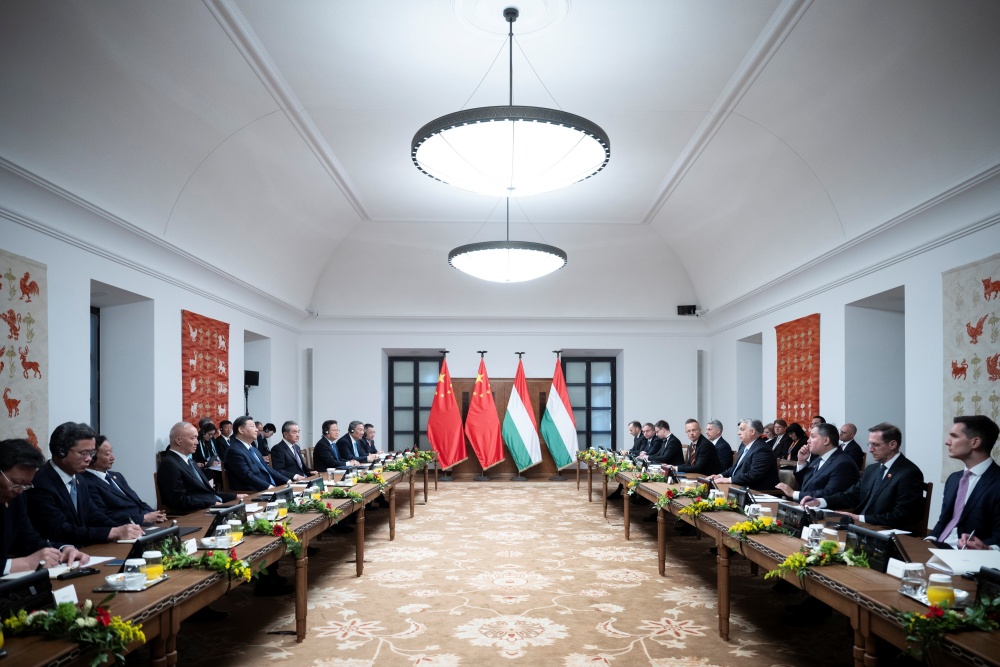
"Today's result is worthy of this historic visit," the Foreign Minister said.Continue reading
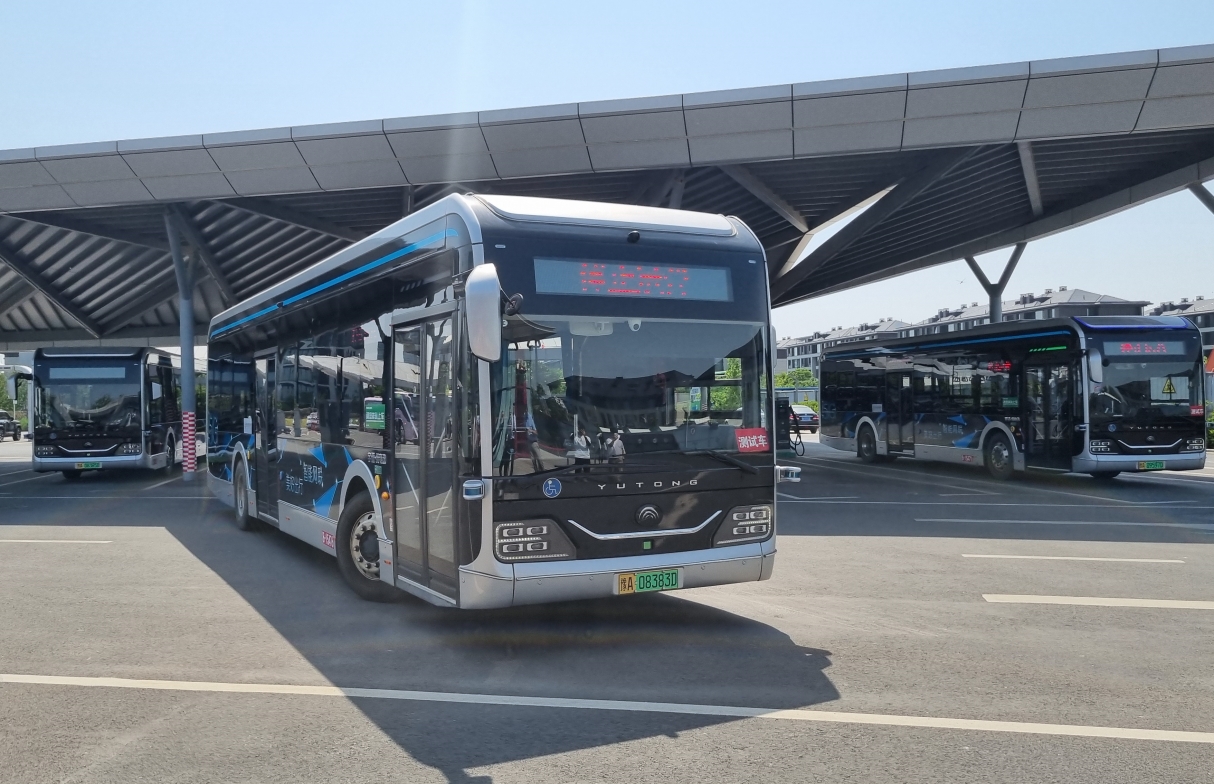
In view of recent announcements regarding Chinese automotive investment in Hungary, as well as the wider debate concerning the success of Chinese car manufacturers in the EU market, we have been seeking an opportunity to see for ourselves what makes the Asian giant’s car industry into a global force that established European and US car giants must reckon with. When the Yutong bus company have offered us a chance to see their manufacturing plant in Zhengzhou, Henan Province, the Hungary Today team had welcomed this opportunity and prepared for the 7500 km journey to the heart of China. This is a unique, unbiased account of what we have seen and experienced, not a sponsored article.

Zhengzhou, a city of ten million people, home to Yutong bus. Photo: Hungary Today
The basic question we would like our readers to engage with is this: should the EU keep its doors open for Chinese auto-makers, or should it protect its industry with recently proposed protectionist measures, such as tariffs. Ironically, it is the European car industry itself, most notably German car manufacturers who have warned against such measures saying this could seriously backfire. Such an unexpected reaction from those whose interests are apparently being protected by the market-protectionist EU proposals hints at a worrying fact, namely that Brussels’ planned measures seem to follow a political order-book rather than an industry-driven demand.

Entrance to the Yutong Welcome Center, Zhengzhou. Photo: Hungary Today
The justification for the European Commission’s investigation into Chinese car manufacturers could be summed up by EC President Ursula von der Leyen’s words: “Global markets are now flooded with cheaper Chinese electric cars. And their price is kept artificially low by huge state subsidies. This is distorting our market”. From what we have seen in China this is a serious simplification of why Chinese cars are cheaper while also technologically being on par with European brands. Such opinions are risky not only because they could be viewed by Chinese manufacturers as unfair, but more importantly, because they call into question the competence of some of the EU’s top leaders and could unwittingly jeopardize the competitiveness of the European car industry.
So let us see what else could explain the Chinese automotive industry’s success other than “huge state subsidies”.
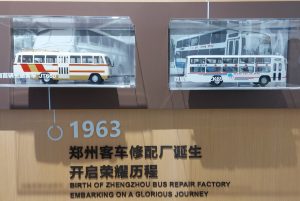
How it all started. Photo: Hungary Today
Today, some 99% of newly commissioned buses in China are powered by so called “New Energy”, such as hydrogen or electricity, a number that Europe can only dream about. Among them, Yutong bus is the largest bus manufacturer in China and one of the largest in the world. Rebranded from the Zhengzhou Bus Company founded in 1963, Yutong has quickly entered the fast lane: its sales volume of large and medium-sized buses ranked No. 1 in China in 2003 and No. 1 in the world in 2010. Both records have been maintained to this day. In 2022, Yutong Bus successively provided mobility guarantee for the Beijing Winter Olympic Games, the Qatar World Cup and other international large-scale events.
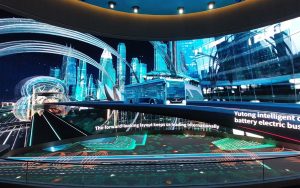
It would not be a Chinese bus manufacturer without a 3D screen with moving chairs. Photo: Hungary Today
The four factories of Yutong have an annual production capacity of over 150,000 vehicles. In terms of the industrial chain, Yutong independently develops and expands key components for their vehicles. At the same time, it cooperates with industry chain partners in electrification, hydrogen fuel and autonomous driving to jointly promote industrial development through innovation.
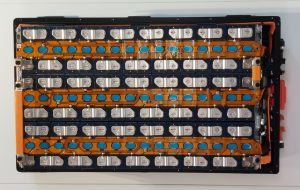
Battery development and manufacturing is an integral part of Yutong’s business. Photo: Hungary Today
By 2023, Yutong’s bus plant has ranked first in China for 20 consecutive years, with a global market share of over 10%. In 2019, Yutong won three Busworld awards, including the design and environmental protection awards. Yutong has sold to more than 40 countries and regions, covering the areas of Europe, America, Africa, Asia-Pacific and Middle East.
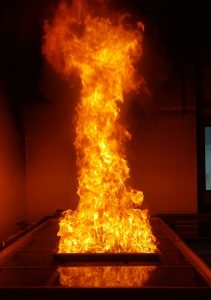
Batteries are tested to destruction, fire resistance is essential. Photo: Hungary Today
During our visit we have been pleasantly surprised by the working conditions in which the company’s employees work. The production floor at the plant is squeaky clean, large parts of the line are automated and high-tech. The scale of the operation is hard to describe as we have only seen small parts of the plant, but the proportions are massive. The 13.000 employees have huge canteens on site. Watching the interactions between the company’s top managers and junior employees the relationship seemed to possess a surprising amount of immediacy in contrast to, let us say, German or Japanese corporate culture. The second most common criticism against Chinese car companies apart from the “state subsidies” narrative, namely that they are only able to produce cheaply because their employees work in sweatshop-like dangerous conditions, simply does not stack up.
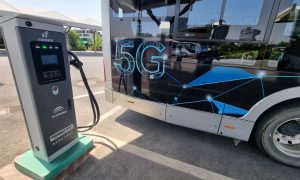
City buses have their own charging stations. Photo: Hungary Today
Their technological advancements, abundant work-force, computerized manufacturing, strong emphasis on EV, etc., would explain their competitiveness among other global manufacturers who employ the same techniques. But what gives them the edge? This is a crucial question, and the possible answer came from the presentation by Mr. Jack Li, CEO of Yutong Bus Europe. In his remarks he explained that Chinese automotive manufacturers are put through a “fierce competition” for their internal market, which means that only those that come up on top are then able to compete on an international scale. In his words, the Chinese government offers them all the necessary help, but the government also puts the bar very high for domestic companies.
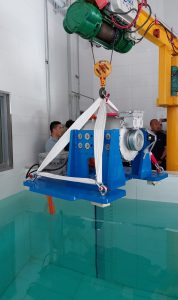
The engine is submerged in water and run 2 meters deep for an hour. Photo: Hungary Today
The green targets set by Beijing are exceptionally ambitious, and as far as cars or traffic are concerned, one needs only to take a stroll at a major junction in Beijing or Shanghai to experience the amazing progress they have made in the past few years, and their huge advance over European cities in running their traffic on new energy. The images of smog-choked Chinese cities from only a few years ago are no more.
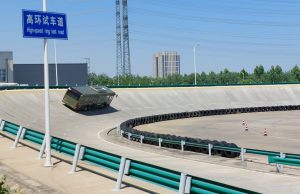
In-house test track. Photo: Hungary Today
The race for the domestic market is absolutely crucial in understanding the Chinese manufacturing success: this is where the economy of scale offers an enormous advantage to Chinese brands, where serving a population of nearly 1.5 billion will offer a test environment and economic opportunities that European manufacturers can only dream of. By the time brands like Yutong come to us, they have the development level and resources that few other countries’ manufacturers possess.
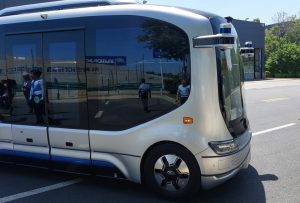
Autonomous driverless minibuses roam the enormous plant. Photo: Hungary Today
This also raises the questions as to what motivates them to enter the often frustrating, overregulated policy minefield called the “EU market”. Their sales here, compared to their domestic market, are relatively modest, but one of Yutong’s executives has explained that there is an element of prestige in having success in Europe. Having sales success globally is beneficial for obvious reasons, but making it in Europe counts as a major achievement back in China.
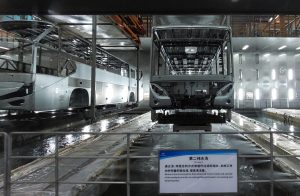
The raw frames are dipped into anti-corrosive substance. Photo: Hungary Today
When observing the Chinese giant from close up it becomes obvious that their strength does not merely lie in being so numerous. What is just as important is that they are also pulling essentially in the same direction. Without the latter, the first advantage would be negated. They are disciplined and enormously competitive by nature. Europe needs to match that if it wants to compete with China in the long term, trade protectionism will only offer a temporary respite and a false sense of security.
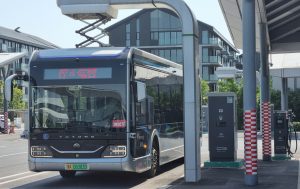
Once it dropped off the passengers, the bus autonomously drives itself underneath the charging station, which then starts the charging process without human intervention. Photo: Hungary Today
One area where we still have an advantage though is that we in Europe are still the trend-setters, not the Chinese. They, however, have the centuries-long strategy to recognize these global trends early, such as green transit policies, and adopt them well before those who had come up with them in the first place.
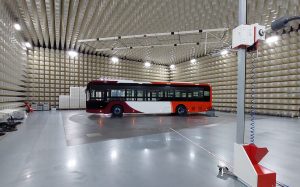
Noise-tests are performed on every model. Photo: Hungary Today
Speaking to Yutong managers about policy, EU measures, trade-protectionism, etc., one noticed that after a couple of polite remarks they always returned to technology, EV, production and their buses. One had the distinct impression that instead of a group of people who, according to European and US media, are hell-bent on a hostile takeover of our car industry, we were talking to “bus-people”. Professionals who live and breath buses, and have little appetite to get involved in geopolitics. This is pretty much the opposite of the impression one gets when speaking with European company managers. When you query them about substance, they invariably talk about politics. These ESG-obsessed activist Western company managers then get promptly left behind by their technology and product quality-focused Asian counterparts.
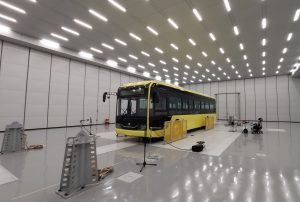
Photo: Hungary Today
The 57 billion dollars that the Chinese government had reportedly spent on EV subsidies between 2016-2022 is a huge sum, but this is a “mere” 8 billion a year for a market of nearly 1.5 billion. To put this into perspective, Germany alone had spent 9.5 billion Euros on subsidizing the purchase of EVs, while its population is 17 times smaller than that of China. As to the topic of market share, German manufacturers account for a 17% market share of cars sold in China, while their Chinese counterparts only have a 3% share in Germany. Yutong’s managers have also complained about meeting all European regulations when bringing in their buses, only for the goalpost to move as soon as they have fulfilled all the trade-requirements, a phenomenon Hungary is well familiar with, albeit within the political arena.
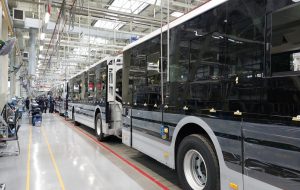
The end of this production line is somewhere over the horizon. Photo: Hungary Today
Hungary was widely criticized by the international media and some politicians for opening its markets and work-force for manufacturers such as BYD or the battery producer CATL. To our question whether Yutong had any current plans for the Hungarian market we have received a reply saying –
Yutong is looking to enter the Hungarian market, and we are actively pushing forward with collaborations on our trolleybus project.”
We have also been informed that they already have an office in Budapest. It appears that our government is clearly staking their bets on the competition-hungry Chinese car industry coming up on top in its battles with protectionist measures from Brussels, which would subsequently offer Hungary an exceptionally competitive position in the European car industry. Both the government in Budapest as well as the leading German car manufacturers understand that Europe cannot score a victory over the Chinese car industry without seriously damaging its own, and that the only way forward is the hard way: producing better quality, technologically more advanced, greener and cheaper cars than the Chinese do.

From School buses to self-driving minibuses, Yutong’s range of models is enormous. Photo: Hungary Today
Featured Image: Hungary Today